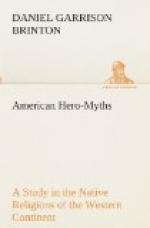Sec.2. Quetzalcoatl the God.
In the ancient and purely mythical narrative, Quetzalcoatl is one of four divine brothers, gods like himself, born in the uttermost or thirteenth heaven to the infinite and uncreated deity, which, in its male manifestations, was known as Tonaca tecutli, Lord of our Existence, and Tzin teotl, God of the Beginning, and in its female expressions as Tonaca cihuatl, Queen of our Existence, Xochiquetzal, Beautiful Rose, Citlallicue, the Star-skirted or the Milky Way, Citlalatonac, the Star that warms, or The Morning, and Chicome coatl, the Seven Serpents.[1]
[Footnote 1: The chief authorities on the birth of the god Quetzalcoatl, are Ramirez de Fuen-leal Historia de los Mexicanos por sus Pinturas, Cap. i, printed in the Anales del Museo Nacional; the Codex Telleriano-Remensis, and the Codex Vaticanus, both of which are in Kingsborough’s Mexican Antiquities.
The usual translation of Tonaca tecutli is “God of our Subsistence,” to, our, naca, flesh, tecutli, chief or lord. It really has a more subtle meaning. Naca is not applied to edible flesh—that is expressed by the word nonoac—but is the flesh of our own bodies, our life, existence. See Anales de Cuauhtitlan, p. 18, note.]
Of these four brothers, two were the black and the red Tezcatlipoca, and the fourth was Huitzilopochtli, the Left handed, the deity adored beyond all others in the city of Mexico. Tezcatlipoca—for the two of the name blend rapidly into one as the myth progresses—was wise beyond compute; he knew all thoughts and hearts, could see to all places, and was distinguished for power and forethought.
At a certain time the four brothers gathered together and consulted concerning the creation of things. The work was left to Quetzalcoatl and Huitzilopochtli. First they made fire, then half a sun, the heavens, the waters and a certain great fish therein, called Cipactli, and from its flesh the solid earth. The first mortals were the man, Cipactonal, and the woman, Oxomuco,[1] and that the son born to them might have a wife, the four gods made one for him out of a hair taken from the head of their divine mother, Xochiquetzal.
[Footnote 1: The names Cipactli and Cipactonal have not been satisfactorily analyzed. The derivation offered by Senor Chavero (Anales del Museo Nacional, Tom. ii, p.116), is merely fanciful; tonal is no doubt from tona, to shine, to warn; and I think cipactli is a softened form with the personal ending from chipauac, something beautiful or clear. Hence the meaning of the compound is The Beautiful Shining One. Oxomuco, which Chavero derives from xomitl, foot, is perhaps the same as Xmukane, the mother of the human race, according to the Popol Vuh, a name which, I have elsewhere shown, appears to be from a Maya root, meaning to conceal or bury in the ground. The hint is of the fertilizing action of the warm light on the seed hidden in the soil. See The Names of the Gods in the Kiche Myths, Trans. of the Amer. Phil. Soc. 1881.]




